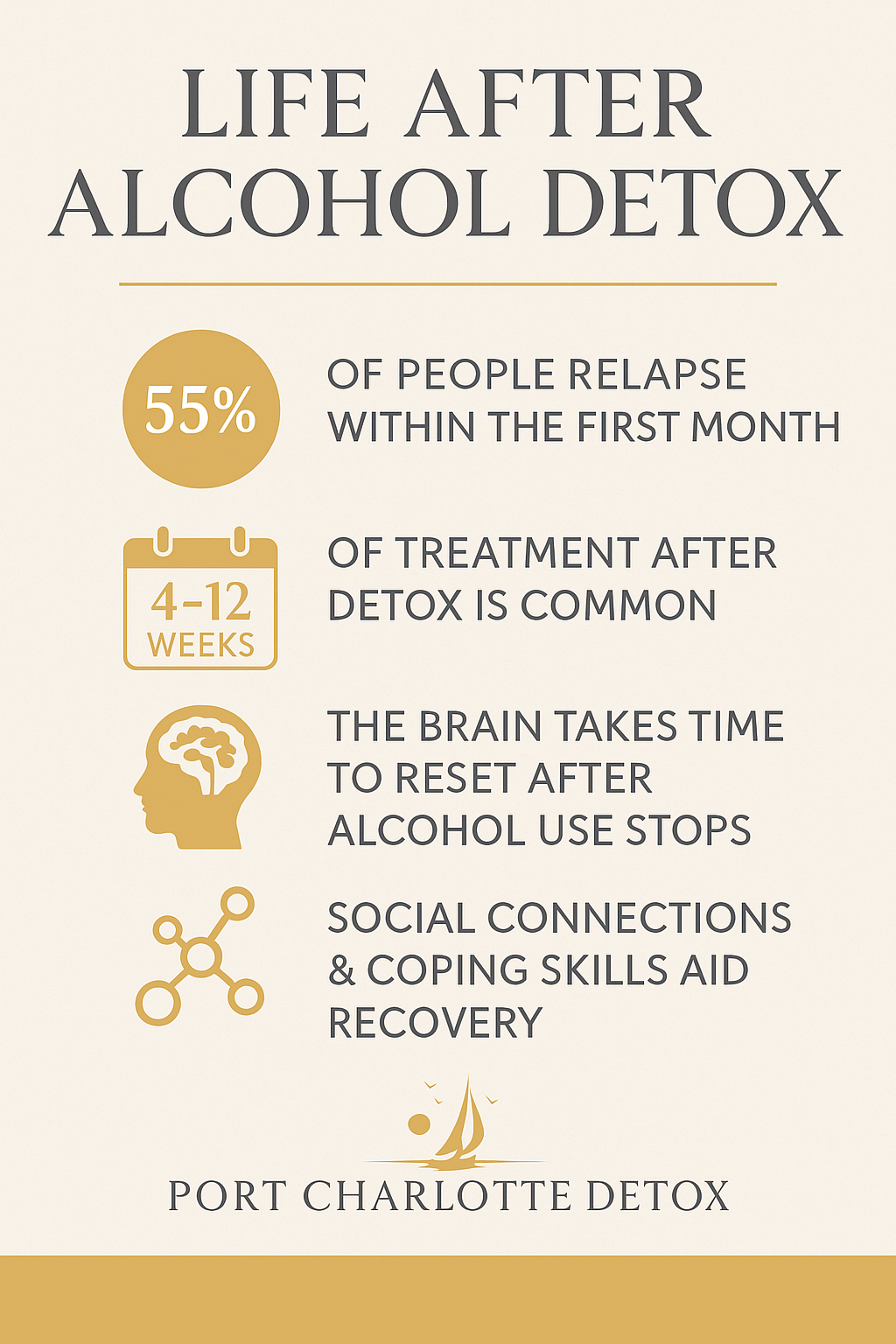Even after detox, the hardest part isn’t over. Not by a long shot.
You can stop drinking. You might’ve already stopped.
But what about Friday nights? What about the friends who still drink? The feelings that hit out of nowhere? That’s when it gets real.
At Port Charlotte Detox, we’ve worked with so many people who didn’t need help quitting—they needed help living. Let’s talk about what that actually means.
Detox Is the Start, Not the Solution
Detox clears alcohol from your system.
It stabilizes your body. Helps you sleep. Gets you through the worst of withdrawal.
But it doesn’t rebuild your confidence.
It doesn’t prepare you for family gatherings, bar invites, or the quiet boredom that creeps in after work.
That’s where deeper alcohol addiction treatment comes in—especially if you’re in or near Port Charlotte, or looking for alcohol addiction treatment in Charlotte County or Fort Myers, FL.
Recovery isn’t just medical. It’s emotional. Social. Relational. And yes—hard.
Why It Feels Harder After Detox
The first few days after detox can feel like a high.
Clear-headed. Rested. Hopeful.
But then reality creeps back in:
- You don’t know what to do with your time
- Your emotions feel raw and unfamiliar
- Your friends don’t get it
- You don’t know who you are without alcohol
This is when many people leave treatment—or ghost their program.
Not because they don’t care.
Because they’re overwhelmed.
If You Left Treatment Mid-Way, You’re Not Alone
We see it all the time.
You leave detox fired up. You start IOP. You try. But it feels like too much—or not enough.
Then maybe you miss one day.
Then two.
Then you’re too embarrassed to come back.
A former client once told us:
“I thought they’d be disappointed. But when I called, they just said, ‘We’re glad you’re here. Let’s talk about what’s next.’”
If that’s you, we want you to hear this loud and clear:
You’re allowed to return. No explanation needed.
Your Brain Is Rewiring—and That Takes Support
Sobriety is a neurological rewire.
Alcohol hijacks your reward system. It becomes the shortcut to calm, comfort, and control. When you stop drinking, your brain doesn’t magically bounce back.
The part of your brain that says “this is fun” or “this helps” is still wired for alcohol. That’s why it’s not just about not drinking. It’s about learning new ways to feel okay.
And let’s be real: that takes longer than a detox stay.
Learning to Live Without It Means Facing What It Gave You
For a lot of people, alcohol isn’t just a bad habit.
It’s been a social tool. A painkiller. A way to connect. A way to disappear.
So when you stop drinking, you don’t just lose the substance.
You lose what it used to give you—comfort, ease, confidence, quiet.
Rebuilding life means finding new ways to feel those things. And at first?
It might feel like nothing works. But that doesn’t mean you’re not working.
What We Focus on After Detox
At our alcohol addiction treatment center in Port Charlotte, we don’t expect you to feel “fixed” after detox. That’s just the opening chapter. Here’s what we work on next:
- Emotional regulation: Learning to feel without numbing
- Social rebuilding: Navigating friendships, family, and dating sober
- Stress strategies: Creating new ways to self-soothe and calm your system
- Relapse planning: Not just “avoid it”—but “what to do when you feel it coming”
- Identity support: Helping you reconnect with who you are, not just who you were when drinking
It’s Okay If You Tried on Your Own First
Many people attempt sobriety solo.
They attend a few meetings, stop drinking cold turkey, maybe even make it a few months.
But when life hits—grief, money stress, loneliness—old patterns creep back in.
Trying on your own isn’t failure. It’s information. It shows you care. It shows you’re trying.
If you’re seeking alcohol addiction treatment in Charlotte County or surrounding areas and wondering if “this time will be different,” the answer is:
Only if you let it be. Only if you get the support that fills in the gaps—not just the gap left by alcohol.
“What If I’m Just Not Cut Out for Sobriety?”
We hear that fear all the time.
You’re not alone. Especially if you’ve left treatment or dropped out of IOP.
Here’s the truth:
No one is “cut out” for this.
Everyone builds it—day by day, awkward conversation by awkward conversation, failed strategy by better one.
You’re not behind. You’re in process.
And you’re allowed to ask for help again.
FAQ: Alcohol Addiction Treatment in Port Charlotte, FL
How long is treatment after detox?
Most people benefit from 4–12 weeks of structured support after detox. We offer outpatient options that can flex around your schedule, especially if you’re returning after a break.
What if I already left once—can I still come back?
Yes. 100%. We don’t close the door. Whether you ghosted or just quietly stopped showing up, you’re still welcome here.
Do I have to restart detox if I used again?
Not necessarily. We’ll assess your current state. If you’ve resumed heavy drinking, detox might be needed again—but we won’t judge. We’ll help you stabilize safely.
What if I’m scared to try again?
That fear makes sense. But it doesn’t mean you’re not ready. You don’t have to commit to everything today. Just reach out. Talk to someone. That’s enough for now.
Do you offer treatment near Fort Myers or Charlotte County?
Yes. We provide alcohol addiction treatment for residents across Charlotte County and surrounding areas, including Fort Myers, FL.
We’re Still Here. The Door’s Still Open.
If you’re feeling stuck, scared, or unsure if you can “start over,” hear this:
You’re not starting over. You’re continuing with more information. More self-awareness. More truth.
📞 Call (844)336-2690 or visit our alcohol addiction treatment page in Port Charlotte, Florida to talk with someone who gets it.
No judgment. No lectures. Just a way back in.



